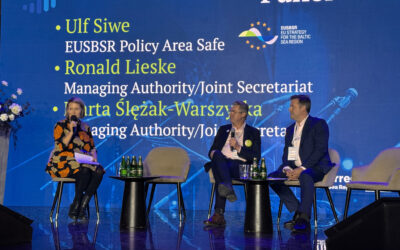Design centres in the Baltic Sea Region have teamed up to turn their region into a forerunner for eco-design – a design approach crucial to a circular economy. Interreg Baltic Sea Region recently approved EUR 2.3 million to support EcoDesign Circle, international cooperation project that wants to push forward the change towards green growth in the Baltic Sea Region.
In early December 2015, the European Commission adopted an ambitious new Circular Economy Package, which consists of an EU Action plan and proposals for the revision of four key waste management directives. The Interreg Programmes play an important role in achieving this ambitious transition. One example is the project EcoDesign Circle, recently approved by Interreg Baltic Sea Region, which spreads new approaches to production, consumption, waste management and innovation across the macro-region and beyond.
Eco-design products are designed in a way to minimise all negative environmental impacts. They ideally result in zero waste, because they allow 100% of recycling of all materials. The approach is so far only sparsely applied as small and medium sized enterprises (SME) are focused on traditional linear business models. The know-how of the environmental impact of products and services is available, but needs translating from environmental science to business reality. Industrial designers, who design everyday life products for mass production, e.g. clothes, kitchen equipment or furniture, play a key role for mainstreaming eco-design.
With support of scientists and design centres, an “ecodesign sprint” tool will be developed within the project: Enterprises are called to express their interest in developing an eco-design product, e.g. a 100 % recyclable football boot or compostable jeans. One company is selected and specifies the undertaking. Several designers develop eco-design ideas and concepts for the undertaking. The client selects the most promising idea for further development and takes it to the commercialisation phase. In this manner, the knowledge about eco-design is introduced into regular business operation of both enterprises and designers. In the long run, this will increase demand of eco-design products and stimulate sustainable profitmaking business.
The project furthermore strives to establish the “Competence Network Ecodesign”, which will be organised under the umbrella of BEDA – the Bureau of European Design Associations. This will allow complementary cooperation among the design centres and will provide policy makers supporting the transition towards a circular economy via the means of eco-design with an efficient implementing body.
EU policy paves the way
The Circular Economy package consists of an EU Action plan and proposals for the revision of four key waste management directives, i.e. on waste, packaging waste, landfill and electrical and electronic waste. First Vice-President of the European Commission Frans Timmermans, responsible for sustainable development, said: “The circular economy is about a profound transformation of the way our entire economy works. By rethinking the way we produce, work and buy we can generate new opportunities and create new jobs.”
Related links
» European Commission press release “Closing the loop”
» EU Action Plan for Circular Economy
» Project summary of Ecodesign Circle







